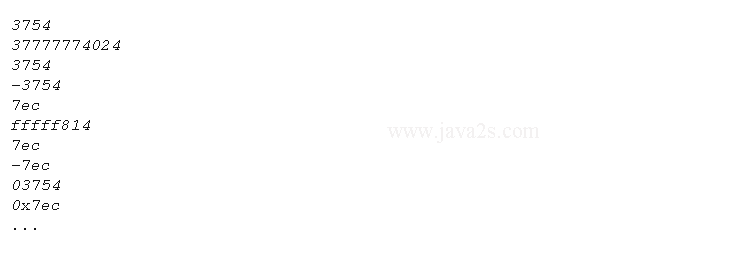Java - Format integer as base 8 and base-16
Introduction
When conversions 'o' and 'x' are used with a negative argument of byte, Byte, short, Short, int, Integer, long, and Long data types, the argument value is converted to an unsigned number by adding a number 2N to it, where N is the number of bits used to represent the value of the data type of the argument.
For example, if the argument data type is byte, which takes 8 bits to store the value, the argument value of -X will be converted to a positive value of -X + 256 by adding 256 to it and the result contain the base-8 or base-16 equivalent of the value -X + 256.
The conversions 'o' and 'x' do not transform the negative argument value to an unsigned value for a BigInteger argument type.
Consider the following code:
Demo
public class Main { public static void main(String[] args) { byte b1 = 9;//from ww w . ja va2 s .c o m byte b2 = -9; System.out.printf("%o %n", b1); System.out.printf("%o %n", b2); } }
Result

The conversion 'o' outputs the base-8 integer 11 for a positive decimal integer 9.
However, when a negative decimal integer -9 is used with the 'o' conversion, -9 is converted to a positive number -9 + 256 (=247).
The final output contains 367, which is the base-8 equivalent of the decimal 247.
The following code shows some more examples of 'o' and 'x' conversions for int and BigInteger argument types:
Demo
import java.math.BigInteger; public class Main { public static void main(String[] args) { System.out.printf("%o %n", 2028); System.out.printf("%o %n", -2028); System.out.printf("%o %n", new BigInteger("2028")); System.out.printf("%o %n", new BigInteger("-2028")); System.out.printf("%x %n", 2028); System.out.printf("%x %n", -2028); System.out.printf("%x %n", new BigInteger("2028")); System.out.printf("%x %n", new BigInteger("-2028")); System.out.printf("%#o %n", 2028); System.out.printf("%#x %n", 2028); System.out.printf("%#o %n", new BigInteger("2028")); System.out.printf("%#x %n", new BigInteger("2028")); }/*from w w w .j a va 2 s .c o m*/ }
Result

Locale
Many locale-specific formatting are automatically applied when a numeric value is formatted.
The following code shows the same number 1234567890 formatted differently for three different locales US, Indian, and Thailand:
Demo
import java.util.Locale; public class Main { public static void main(String[] args) { Locale englishUS = new Locale("en", "US"); Locale hindiIndia = new Locale("hi", "IN"); Locale thaiThailand = new Locale("th", "TH", "TH"); System.out.printf(englishUS, "%d %n", 1234567890); System.out.printf(hindiIndia, "%d %n", 1234567890); System.out.printf(thaiThailand, "%d %n", 1234567890); }//w ww . j a v a 2 s .c o m }
Result
